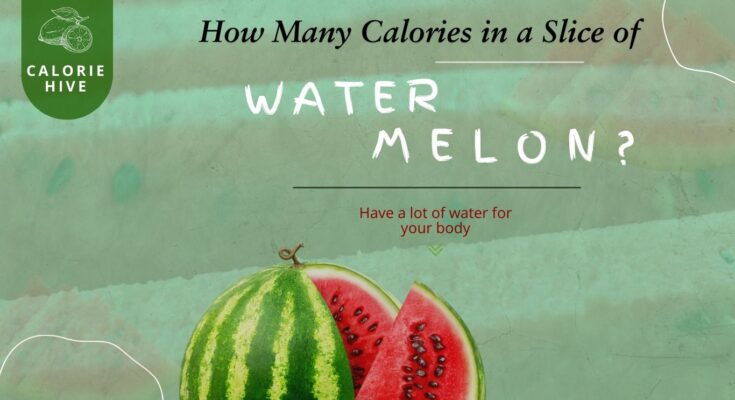When the summer heat hits, nothing feels more refreshing than biting into a juicy, delicious slice of watermelon. This hydrating fruit is not only surprisingly low in calories, making it a perfect snack for weight watchers and health conscious individuals.
But exactly how many calories are in a slice of this watermelon? Let’s break it down One known cup of watermelon contains about 46 calories. Find out more what’s written down there!
Here, we’ll examine the calories in watermelon, compare it to other fruits, explore its health benefits, and answer common questions about incorporating it into a healthy lifestyle.
How Watermelon Fits into a Healthy Diet
If you eat watermelon, the question will come to your mind How Many Calories in a Slice of Watermelon? It is not just a delicious, refreshing summer fruit. It offers long-term health benefits, which make it an excellent addition to a balanced and healthy diet.
It is a very low-calorie food you can add to your diet plan. In summer, you should eat lots of watermelons because they keep you hydrated, manage your weight, and increase your intake of essential vitamins and minerals.
A standard 100-gram slice of watermelon contains around 30 calories. This makes watermelon one of the lowest-calorie fruits, thanks to its high water content—over 90% of watermelon is water!
| Nutrient | Amount (per 100g slice) |
| Calories | 30 kcal |
| Carbohydrates | 7.5 g |
| Sugars | 6.2 g |
| Protein | 0.6 g |
| Fat | 0.2 g |
| Fiber | 0.4 g |
| Water Content | ~91% |
Watermelon is one of the lowest-calorie fruits available, largely because it has a very high water content about 91% of watermelon is water! This means that most of what you consume is pure hydration, combined with a hint of natural sweetness.
A Guide to portion Sizes and Calorie
EstimatesWhile 100g of watermelon has around 30 calories, actual slices vary in size. Here are some common portion sizes and their approximate calorie counts:
- Small slice (~100g): 30 calories
- 1 cup diced (~150g): 45 calories
- Large wedge (~280g): 85 calories
- Quarter medium watermelon (~1.3kg): ~390 calories
- Half medium watermelon (~2.3kg): ~690 calories
Comparing Watermelon with Other Fruits
To see how light watermelon really is, here’s a calorie comparison per 100g:
- Watermelon: 30 kcal
- Apple: 52 kcal
- Banana: 89 kcal
- Grapes: 69 kcal
- Mango: 60 kcal
- Pineapple: 50 kcal
Clearly, watermelon is one of the lowest-calorie fruits, making it a great choice for anyone trying to cut calories without sacrificing flavor.
Vitamins and Minerals in Watermelon
Watermelon is not just about low calories—it’s packed with essential nutrients. Here are some key ones:
- Vitamin C: Boosts immunity and skin health.
- Vitamin A (from beta-carotene): Supports vision and skin.
- Potassium: Helps regulate blood pressure and fluid balance.
- Magnesium: Supports muscle and nerve function.
-
Lycopene: A powerful antioxidant linked to heart health and cancer prevention.
These nutrients make watermelon not only refreshing but also nutrient-dense, offering more benefits than just hydration.

USES OF WATERMELON
First we will see How Many Calories in a Slice of Watermelon? and then we will know about its uses. It is a very low-calorie fruit, and this fruit of multiple uses that can be eaten and utilized in various ways.
For example: Drinks, face washes, hand cleansers, hair conditioners, hand lotions, and skin treatments can all be prepared using antioxidant antioxidant-beneficial attributes found in the kitchen.
If you practice taking your slices on a hot day, then watermelon silky recipes are perfect for you! And use if, for beauty purposes, the work of watermelon is as effective as the text. Therefore, it is best to take advantage of this sweet fruit in every part of your life!
What are the health benefits of Watermelon?
There are five common types of watermelon: seeded, seedless, mini, yellow, and orange.
Health Benefits of Watermelon:
- It provides various health benefits, including carbohydrates and essential nutrients.
- Its over 90% water content is very beneficial in hot seasons like summer when it helps to burst the heat.
- It can also serve as a dessert when it has sweet natural sugars.
- May have anti-cancer effects.
- May improve heart health.
- It is provide Skin Health.
That is why watermelon is also rich in antioxidants. Some of these substances can aid in the pulling out of molecules found in the body as free radicals or reactive species. It is necessary to understand that the human organism generates free radicals during regular metabolic processes. They can also occur due to smoking and exposure to air pollution, stress, etc.
If too many free radicals remain set in the body, oxidation stress is likely to take place. It can cause cell damage and can lead to several diseases, inclusive of cancer and heart disease.
As Free radicals, the body can eliminate some of them on its own, but that’s where dietary antioxidants come in.
Benefits for Bones and Joints
Watermelon is also very useful for joint pain, bone pain, and inflammation in the body. It contains a natural pigment called Beta-cryptoxanthin, which can protect your joints from inflammation.
- Lycopene: Reduces inflammation, supports bone density, and may lower the risk of osteoporosis.
- Vitamin C: Boosts collagen production, which strengthens cartilage, tendons, and ligaments.
- Potassium: Protects bones from calcium loss and supports bone strength.
- Magnesium helps activate vitamin D, improving calcium absorption and supporting stronger bones.
- Anti-Inflammatory Effect: Lycopene, vitamin C, and hydration help ease joint stiffness and pain.
- Citrulline: Improves circulation, nutrient delivery to joints, and reduces post-exercise soreness.
Overall, watermelon supports bone density, joint flexibility, and reduces inflammation, making it a refreshing ally for skeletal and joint health.
Watermelon is Good for a Weight Loss
Yes, watermelon is an excellent fruit for weight loss. Here’s why:
- Low Calorie Density: You can eat large amounts for very few calories.
- High Water Content: Keeps you feeling full and hydrated.
- Natural Sweetness: Helps reduce cravings for high-calorie desserts.
-
Nutrient-Rich: Supplies vitamins and minerals your body needs while dieting.
Pro tip: Pair watermelon with a source of protein (like Greek yogurt or cottage cheese) to create a balanced, filling snack.
Common Misconceptions About Watermelon Calories
Watermelon is a beloved summer fruit, known for its juicy, refreshing taste and vibrant color. However, several myths about its calorie and nutritional content persist, leading to confusion about its role in a healthy diet. Below, we debunk three common misconceptions about watermelon calories and provide clarity on its nutritional profile.
Misconception 1: “Watermelon is full of sugar.”
While watermelon’s sweet flavor might suggest it’s loaded with sugar, this isn’t entirely accurate. Watermelon contains approximately 6 grams of sugar per 100 grams, which is lower than that of many other fruits, such as bananas (12g/100g), grapes (16g/100g), or mangoes (14g/100g).
The sweetness comes from natural sugars like fructose, but watermelon’s high water content—about 92% water—dilutes its sugar concentration, making it a hydrating, lower-sugar choice compared to other fruits. Additionally, its glycemic index (GI) is moderate (around 72). Still, due to its low carbohydrate content, its glycemic load (GL) is also low, meaning it has a minimal impact on blood sugar levels when consumed in reasonable portions.
Misconception 2: “Eating watermelon at night makes you gain weight.”
A common myth suggests that eating watermelon or any fruit at night leads to weight gain. However, weight gain is determined by total calorie intake over time, not the specific time of day you eat. A 100-gram serving of watermelon contains approximately 30 calories, making it a low-calorie snack, even later in the day.
Unless you’re consistently exceeding your daily calorie needs, eating watermelon at night won’t cause weight gain. In fact, its high water content and fiber can promote feelings of fullness, potentially helping you avoid higher-calorie snacks. The key is moderation and balancing watermelon with other nutrient-dense foods in your diet.
Misconception 3: “Watermelon makes you fat because it’s high in carbs.”
Watermelon is often unfairly labeled as a high-carb fruit, but it’s relatively low in carbohydrates compared to other fruits. A 100-gram serving contains approximately 7.5 grams of carbohydrates, which is significantly less than bananas (23 grams per 100 grams) or apples (14 grams per 100 grams).
Furthermore, watermelon’s high water content and low calorie density make it an unlikely contributor to fat gain when eaten in moderation. The carbs in watermelon are primarily simple sugars, but they also contain fiber, vitamins (such as vitamin C and A), and antioxidants like lycopene, which support overall health. Pairing watermelon with protein or healthy fats can further stabilize blood sugar and enhance satiety, reducing the likelihood of overeating.
Misconception 4: Eating Too Much Watermelon Have Side Effects?
Despite its great taste and many health benefits, eating too much watermelon can raise blood sugar and cause upset stomach in some people. However, everything should be eaten according to their need; otherwise, too much unnecessary food makes everything harmful. Eat everything you need to maintain your health.
Fun Ways to Eat Watermelon Without Adding Calories
Watermelon is a naturally low-calorie, hydrating fruit that’s perfect for creative, healthy recipes. With only about 30 calories per 100 grams and a high water content (92%), it’s an ideal base for delicious, guilt-free dishes. Below are five fun and flavorful ways to enjoy watermelon without adding extra calories, complete with preparation tips and serving suggestions to keep your meals light and refreshing.
1. Chilled Watermelon Slices
Calories: ~30 calories per 100g serving
The simplest and most classic way to enjoy watermelon is by cutting it into wedges and serving it chilled. This method highlights the fruit’s natural sweetness and juiciness, making it a refreshing snack, especially on hot summer days.
To prepare, slice a watermelon into triangular wedges or bite-sized cubes, refrigerate for at least an hour, and serve cold. For an extra touch of flavor without calories, sprinkle with a pinch of fresh mint leaves or a squeeze of lime juice. This no-fuss option is perfect for picnics, barbecues, or a quick hydration boost.
2. Watermelon Fruit Salad
Calories: 40-50 calories per 1-cup serving
Combine watermelon with other low-calorie fruits for a vibrant, nutrient-packed fruit salad. Mix diced watermelon with berries (like strawberries or blueberries), pineapple chunks, and kiwi slices for a colorful and flavorful medley.
The variety of textures and flavors enhances the eating experience while keeping the calorie count low. To prepare, chop all fruits into bite-sized pieces, toss gently in a bowl, and chill before serving. For a zesty kick, add a splash of fresh lemon or orange juice. This salad is a great side dish for brunch or a light dessert that’s naturally sweet and satisfying.
3. Watermelon Smoothies
Calories: 60-70 calories per 2-cup serving
Blend watermelon into a refreshing, low-calorie smoothie for a hydrating drink that’s perfect for breakfast or a post-workout refresh. Combine 2 cups of diced watermelon with a handful of ice and a few fresh mint leaves in a blender for a simple, calorie-free flavor boost.
Blend until smooth, and serve immediately in a chilled glass. For added variety, include other low-calorie fruits like strawberries or cucumber, but avoid adding sweeteners to keep the calorie count minimal. This smoothie is light, refreshing, and perfect for staying hydrated on warm days.
4. Frozen Watermelon Popsicles
Calories: 30 calories per 100g popsicle
Turn watermelon into a fun, frozen treat by making calorie-free popsicles. Puree diced watermelon in a blender until smooth, then pour the juice into popsicle molds and freeze for 4-6 hours.
For a twist, add thin slices of kiwi or a few mint leaves to the molds before freezing for extra visual appeal and flavor. These popsicles are a perfect summer dessert or snack for kids and adults alike, offering a sweet, icy treat without any added sugars or calories. Serve straight from the freezer for a cooling, guilt-free indulgence.
5. Watermelon Salsa
Calories: 40-45 calories per ½-cup serving
For a savory twist, create a watermelon salsa by dicing watermelon into small cubes and combining it with cucumber, red onion, and a squeeze of lime juice. Add a pinch of chopped cilantro or mint for freshness, and optionally include a tiny amount of finely chopped jalapeño for a mild kick (adjust to taste to keep it low-calorie).
Mix all ingredients gently and serve chilled as a dip with cucumber slices or as a topping for grilled vegetables or lean proteins. This salsa is a unique, refreshing way to enjoy watermelon’s sweetness in a savory context, perfect for summer gatherings or as a light appetizer.
Stay hydrated, stay healthy bite into the goodness of watermelon!
To Sum Up With!
Watermelon is more than just a refreshing summer treat—it’s a nutrient-packed, low-calorie fruit that fits perfectly into a balanced lifestyle. With only about 30 calories per 100g slice, it offers hydration, natural sweetness, and a wealth of vitamins, minerals, and antioxidants. From supporting weight loss and hydration to improving heart health, skin vitality, and even bone and joint strength, watermelon proves to be a versatile fruit with countless benefits.
Whether you enjoy it chilled, blended into smoothies, frozen as popsicles, or mixed into salads, watermelon is a guilt-free indulgence that nourishes your body while satisfying your taste buds. Just remember to enjoy it in moderation and pair it with other nutrient-rich foods for the best results.
So the next time you wonder, “How many calories are in a slice of watermelon?”, you’ll know it’s not just about the calories, but the powerful health benefits packed into every juicy bite.
FAQS
Q.1: Can I eat watermelon daily?
Yes, Because watermelon is an antioxidant fruit and is a good source of nutrients. In addition to supporting hydration, it can promote many aspects of health, including heart health and the prevention of certain health conditions.
Q.2: Does watermelon add calories?
It is very low in calories because it doesn’t contain any protein or fat.
Q.3: What is the right time to eat watermelon?
In the opinion of Ayurveda, The right time to eat watermelon is between 10 am and 12 pm as a snack or between breakfast and lunch.
Q.4: What are the benefits of watermelon?
Experiments have shown that its nutrients can lower blood pressure, improve circulation to support heart health, and help relieve joint pain and weight loss, and your May also help protect the skin
Q.5: Is watermelon good for weight loss?
Yes, watermelon contains a lot of water and is also low in calories, so it’s great for weight loss.
You may also like to read: 15 Lowest Calorie Fruits Doctors Don’t Talk About




